GeForce RTX 5060 Ti Review: $429 Blackwell For Gamers And Creators
Our Test System Configuration:
| Hardware Used: AMD Ryzen 7 9800X3D (4.7GHz - 5.2GHz, 8-Core) MSI X870E Carbon WiFi 32GB G.SKILL DDR5-6000 Samsung SSD 990 Integrated Audio / Network Radeon RX 7700 XT Radeon RX 9070 GeForce RTX 3070 Ti GeForce RTX 4070 GeFoce RTX 5070 MSI GeForce RTX 5060 Ti PNY GeForce RTX 5060 Ti Relevant Software: Windows 11 Pro 24H2 AMD Radeon v24.12.1 NVIDIA Drivers v572.50 / v575.94 |
Benchmarks Used: MLPerf Client Geekbench AI Procyon AI Text Generation Procyon AI Stable Diffusion XL Blender v4.3 Blackmagic RAW Speed Test v4.3.1 V-Ray UL 3DMark UL VRMark Unigine Superposition Games Tested: Assassin's Creed Mirage Black Myth Wukon Homeworld 3 Horizon Zero Dawn Remastered Cyberpunk 2077 (press beta) The Talos Principle II F1 24 |
MLPerf Client Benchmarks
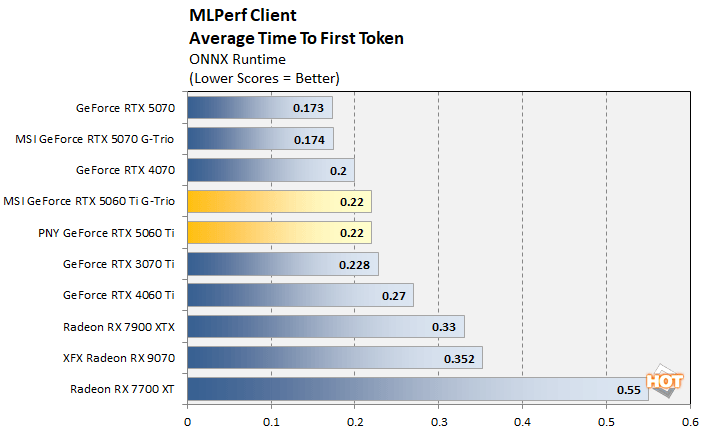
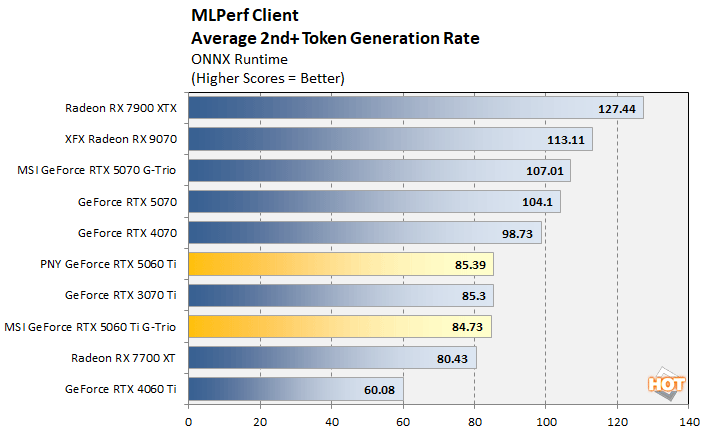
Geekbench AI Testing
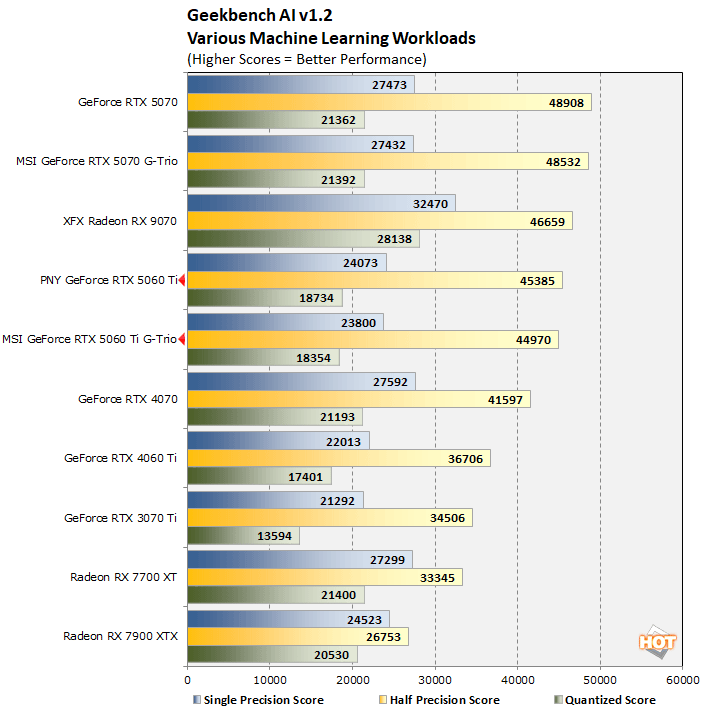
The GeForce RTX 5060 Ti's performance in Geekbench AI is mixed. Here, it pulls ahead of the RTX 4070 in the half precision test, but trails in the single precision and quantized tests. The new GeForce RTX 5060 Ti outpaces the previous-gen RTX 4060 Ti and Radeon RX 7000 series cards easily, though.
UL Procyon AI Text Generation Benchmarks
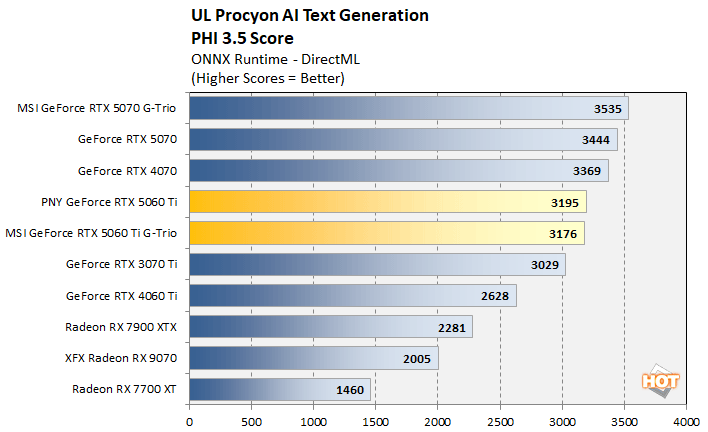
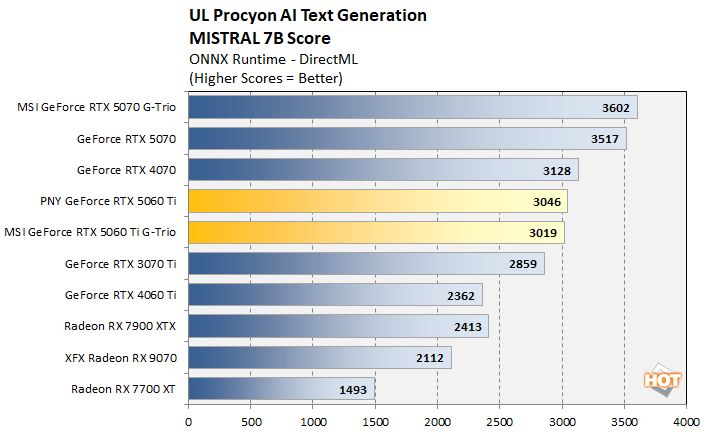
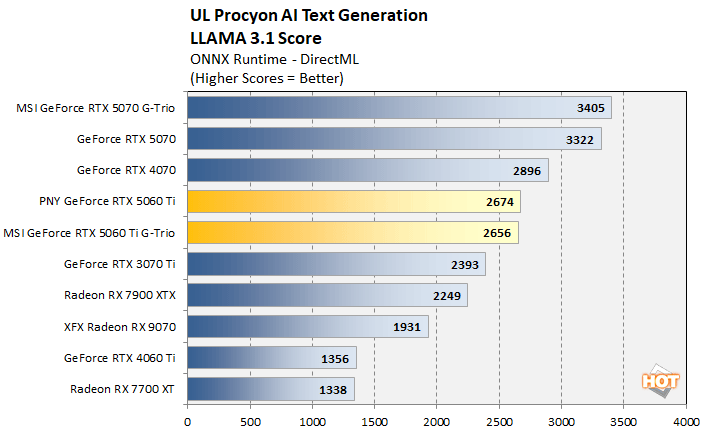
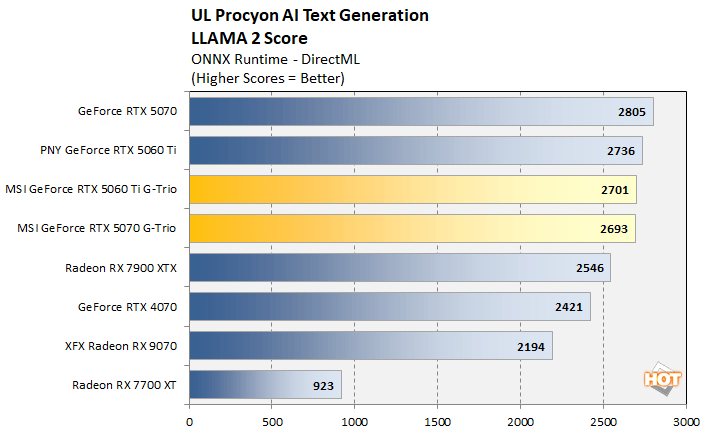
The GeForce RTX 5060 Ti handles the various models in Procyon AI's LLM benchmarks well, and typically slots in just behind the GeForce RTX 4070 and RTX 5070, but well ahead of the RTX 4060 Ti. Note that the RTX 3070 Ti and RTX 4060 fail the final LLAMA 2 benchmark due to insufficient memory, hence their removal from that final chart.
UL Procying Stable Diffusion XL AI Image Generation
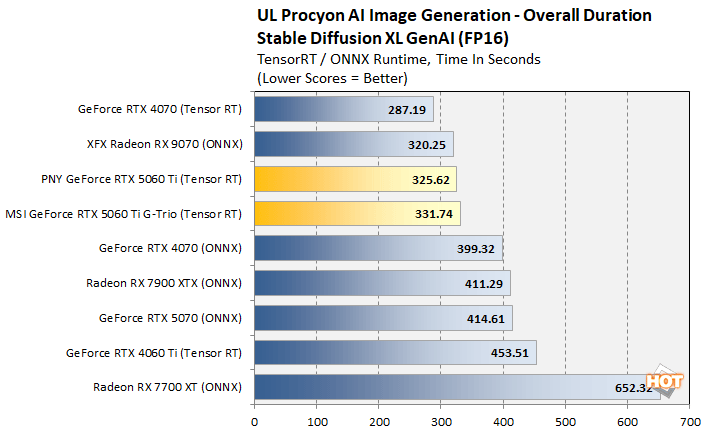
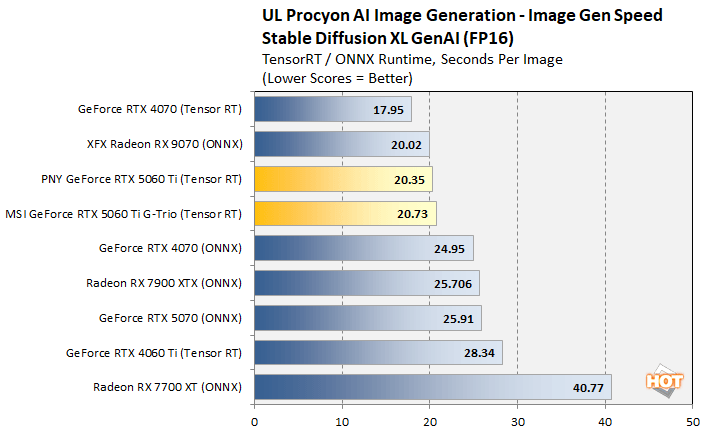
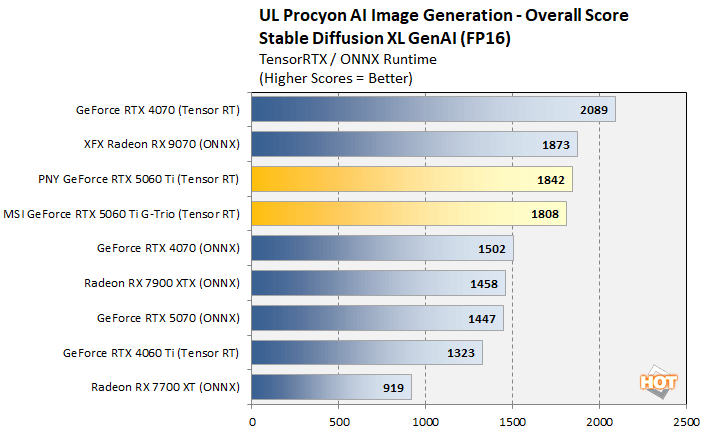
The GeForce RTX 5060 Ti also performs well in the FP16 Procyon AI Stable Diffusion image generation benchmark. Once again we see the new GeForce RTX 5060 Ti outpacing its previous-gen counterpart and landing just behind the GeForce RTX 4070.
Blender v4.3 GPU Rendering Benchmarks
Blender is a free and open source 3D creation suite that can handle everything from modeling, rigging, and animation, through simulation, rendering, compositing, motion tracking, and even video editing or game creation. The developers offer a standalone benchmark tool that will track performance while rendering a handful of models. We used all three of the default models for these tests...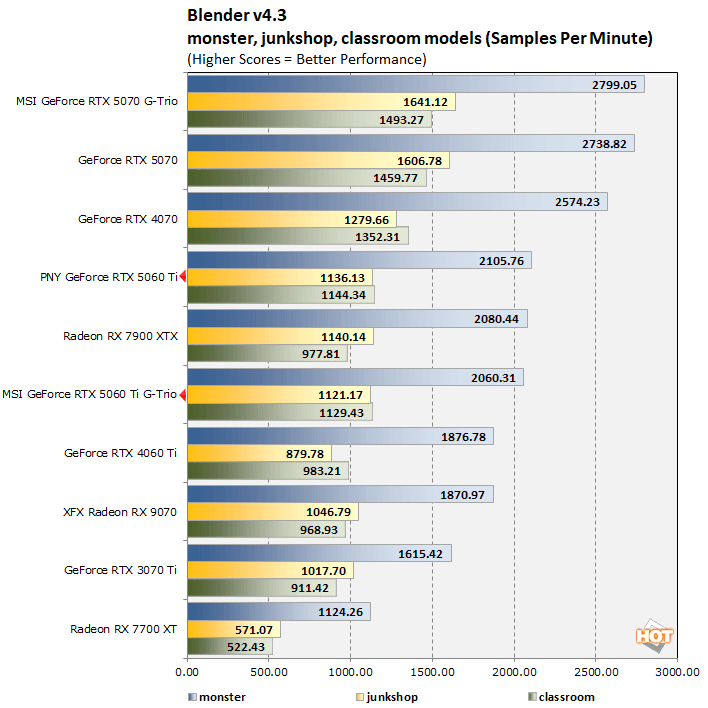
The Blender benchmark's various models show the GeForce RTX 5060 Ti performing right about on par with the Radeon RX 7900 XTX, but well ahead of the newer Radeon RX 9070, and it blows the doors off the Radeon RX 7700 XT. The GeForce RTX 5060 Ti also has no trouble outpacing the RTX 3070 or RTX 4060 Ti, though the RTX 4070 finishes well ahead.
V-Ray Rendering
The V-Ray Benchmark is a free tool that measures rendering performance on CPUs, NVIDIA GPUs, or a combination of both. The GPU benchmark in particular features a complex scene designed to evaluate the capabilities of both the RTX and CUDA-based V-Ray 6 render engines.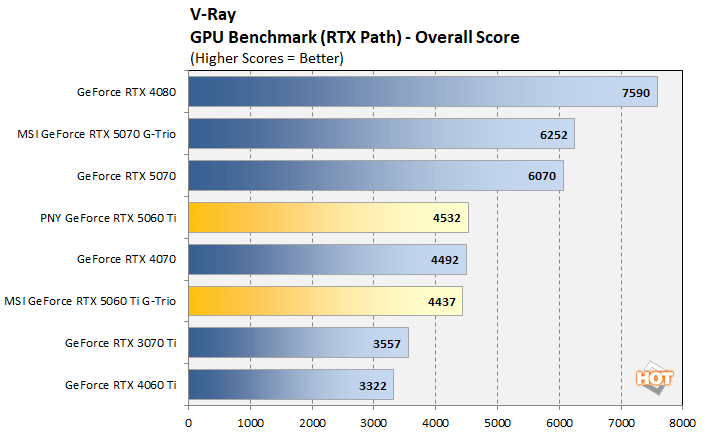
We tested V-Ray using the higher-performing RTX render engine, which leverages the RT cores in NVIDIA GPUs and means no support for Radeons here. The new GeForce RTX 5060 Ti card sandwich the RTX 4070, and smoke the older RTX 3070 Ti and RTX 4060 Ti, but the GeForce RTX 5070 and higher-end cards finish well out in front.
Blackmagic RAW Speed Test Results
The Blackmagic RAW Speed Test is a CPU and GPU benchmarking tool that determines the speed of decoding full-resolution Blackmagic RAW video frames. The tool can be used to evaluate performance at various resolutions and bitrates on the CPU or using OpenCL or CUDA on a GPU. We're reporting four results here, at 8K and 4K resolutions, but at differing bitrates and compression levels.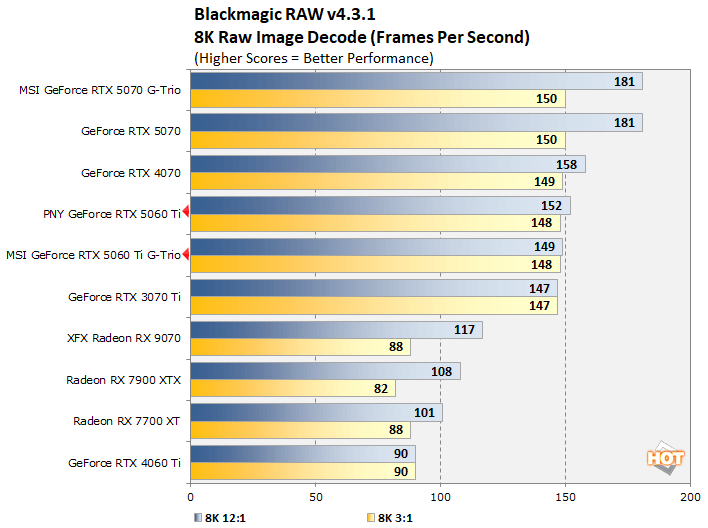
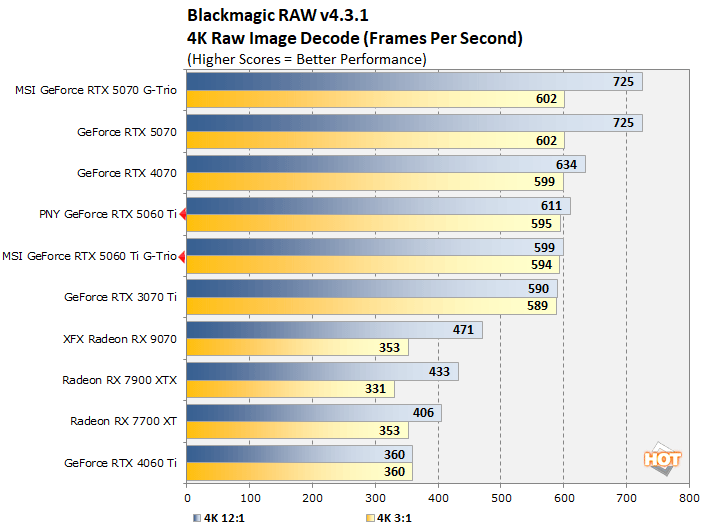
At both resolutions and compression levels, the GeForce RTX 5060 Ti card slot in just behind the GeForce RTX 4070 and RTX 5070. In the more taxing / less compressed 3:1 tests, the deltas are small, but the additional decoder in the RTX 5070 allows it to pull further ahead in the 12:1 test. The GeForce RTX 5060 Ti significantly outpaces the RTX 4060 Ti and all of the Radeons, however.







